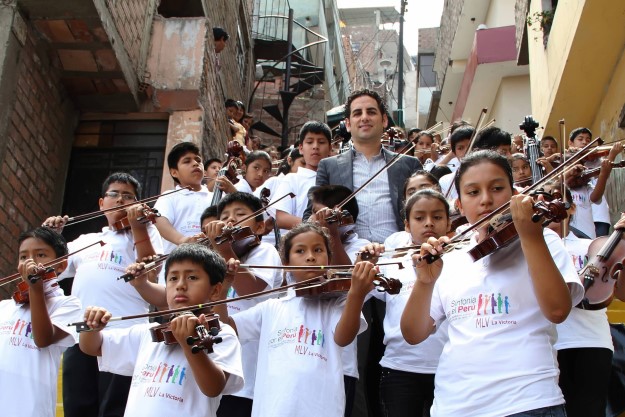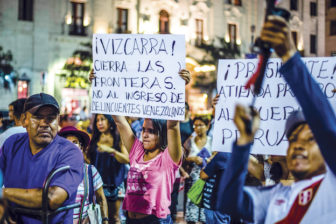Can music help break the poverty cycle? When tenor Juan Diego Flórez, inspired by Venezuela’s El Sistema, first created Sinfonía por el Perú in 2011, he wanted a program that not only taught music but that would offer a family-like environment teaching children in vulnerable conditions teamwork, empathy and self-esteem.
The results are impressive: a 75% decrease in unwanted pregnancies, another 51% decrease in domestic violence as well as a significant increase in grades and even college admissions.
Ana Rosa Prado, a 20-year-old oboe player from Manchay in Lima Province, joined the program when it started eight years ago.“Sinfonía has helped me gain confidence in myself and I have seen this change in my classmates too. Now they realize they do not have to follow the footsteps of their parents but instead they can become an example for them, be a source of pride for them,” she told AQ. “Sinfonía has become a family for me,” said Prado who studied communications in college and now helps coordinate Sinfonía students.
Flórez was first introduced to the concept when he visited Venezuela in 2009 to perform with conductor and violinist Gustavo Dudamel. Venezuela’s El Sistema was an internationally acclaimed program known to have helped children from environments of crime and drug abuse since its creation in 1975. Dudamel, who currently leads the Simón Bolivar Symphony Orchestra , as well as the Los Angeles Philharmonic, is probably its most famous alumni. “I was so impressed and deeply moved I told myself I had to bring this to Perú immediately,” Flórez told AQ. “I became captivated by the notion that music can transform society and protect children.”
Unlike El Sistema, which is fully run by the Venezuelan government, Sinfonía por el Perú is funded by multiple organizations including the Inter-American Development Bank – which helped launch the program – as well as European funds and Peruvian companies. Sinfonía’s manager Cesar Oré says being privately funded requires an extra effort but allows the program to grow and not be impacted by changes in government.
The after-school program currently has 20 núcleos or core groups attending around 500 children in choirs and orchestras and 11 smaller centers where a single teacher leads a chorus of up to 120 students. Children from age five attend lessons at least four times a week and the main orchestra has been invited to the Salzburg festival and Carnegie Hall in New York.
“Poverty is the drive,” Flórez told AQ. “They hold on to the only thing they have which is the orchestra, their instrument, and that makes them happy, so they learn a lot faster than a privileged child. We are not giving shelter or food, we are giving tools and skills.”
In poor communities, where safe environments are scarce and children are often exposed to child labor, drugs and crime, the program becomes a refuge. “At the end of the day what is poverty? It is a sense of abandonment from society. There is material poverty but there is also spiritual and mental poverty, which is abandonment,” Flórez said.
“In the orchestra or in the chorus the child acquires self-esteem and public admiration and he does not feel poor anymore. They might lack material goods but at least they believe in themselves, they believe in their dreams, they feel capable and important.”
—
Uriegas is an editorial intern for AQ.







